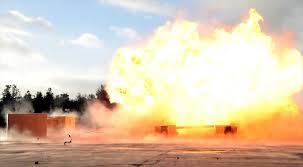UK Gas Testing Site to Host Anniversary Explosions
The UK Explosion Liaison Group (UKELG) is to hold its 35th anniversary event at the former British Gas-owned Spadeadam testing and research facility in Cumbria, said DNV GL August 17.
The event will run from October 10-12 and will include high explosives and high consequence deflagrations and hydrogen explosions as well as a full-scale vented gas explosion.
Imperial College Professor Hans Michels, Chair of the UKELG Committee said: “Our bi-annual one-day discussion meetings have selectively considered a great variety of individual topics; of these, some have also been revisited, often in response to interest and requests from our participants... Few locations within the UK can offer the technical facilities and opportunities to make such an occasion a professionally relevant and celebratory event and we are therefore delighted to have been invited by Spadeadam on the occasion of our 35th anniversary year.”
DNV GL's head of research and innovation at the site and UKELG committee member Dan Allason added: “We are delighted that UKELG is holding this anniversary event at the facility. Members of the group have a wealth of experience and Spadeadam is an ideal environment in which to explore and analyse explosions, their impact and mitigation. We will be making this an event that will differ from any other, as we have the experience and facilities to demonstrate explosions in various scenarios.” The event will be open to both members and non members of UKELG.
The infrastructure design and consultancy division of what used to be British Gas, Advantica, used the site for testing pipelines to destruction, among other things. UK infrastructure operator National Grid sold Advantica to Germanischer Lloyd in 2007, which merged with Det Norske Veritas in 2012.
Spadeadam is also used by the Ministry of Defence. According to the Royal Airforce, it is "the only facility in Europe where aircrews can practise manoeuvres and tactics against a variety of threats and targets that they face in contemporary warfare."
William Powell



